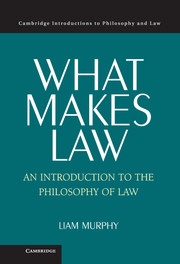9 - Conclusion: What Matters?
Published online by Cambridge University Press: 05 July 2014
Summary
The discussion of calls for new law in the previous chapter suggests that the question of what makes a normative order a legal order rather than something else matters. To say that “there ought to be a law against it” cannot just mean that someone should stop it, but neither can it mean just that it is wrong or that people should believe it is wrong. It seems worth reflecting on just what we are asking for when we say that.
Of course, if we never in fact needed to know the content of the law in force – if, that is, eliminativism about the law were the right view to take – then we would have no good reason to call for a new law, or a new kind of law. We should rather call for new kinds of institutions and practices of various kinds, and better ways of understanding the moral responsibility of those who occupy various roles within those structures. So eliminativism would render both kinds of question about the nature of law empty.
I have rejected eliminativism. I believe we do need to know the content of the law in force, most importantly because we often have moral reason to comply with law. State officials typically have very strong moral reason to comply with law. It matters what the law is, and therefore the dispute over the grounds of law matters.
But that dispute seems to be in a strange condition. I have claimed that no argument is in sight to move the discussion about the grounds of law forward. I have also argued that this does not matter very much because the two positions agree in very many cases about the factors relevant to determining the content of law. Am I not saying both that the dispute matters and that it doesn't?
- Type
- Chapter
- Information
- What Makes LawAn Introduction to the Philosophy of Law, pp. 183 - 188Publisher: Cambridge University PressPrint publication year: 2014



